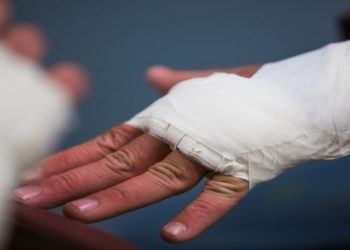Accidents are an unfortunate commonality among the working population. According to the Health and Safety Executive, workplace illness and injury together cost the UK £18.8 billion annually; more than 500,000 workers suffer an injury at work each year.
Accidents do not necessarily happen for no reason – and in many cases, employers shoulder responsibility for the incident through negligent practices or other failures to uphold a duty of care. In these instances, workers must understand their statutory rights and seek civil routes to compensation. But what are the more common reasons for which such action might be taken?
Slips, Trips and Falls
As corroborated by data from the Royal Society for the Prevention of Accidents (ROSPA), slips trips and falls are the most common cause of workplace injury altogether – costing employers £500 million each year. Trip and slip hazards are widespread, and can be found in every working environment; construction sites naturally offer a greater degree of risk than other administrative workplaces, but even the office can provide hazards in the form of boxes, cables, spilt liquids and dropped cleaning equipment.
Noise Exposure
Another extremely common form of workplace injury is much less talked about than other, more obvious forms of injury and claim: noise exposure. Loud volumes are well-known to cause significant hearing damage in the short term, but there are also long-term hearing – and even neurological – implications attached to extended exposure to relatively loud sounds.
Sounds equivalent in volume to rush hour traffic are enough to cause hearing loss over time, with manufacturing and construction sites more commonly presenting such volumes through running equipment and tools.
Repetitive Strain Injury
Repetitive Strain Injury, or RSI, might seem an occupational risk separate from those that could invite a successful civil claim against an employer. However, it is no different in the eyes of the law; if an injured party can demonstrate their employer was negligent concerning safeguarding against such an injury, an RSI claim would be very much on the cards.
RSI, of course, is a musculoskeletal injury that occurs through repetitive motions, whether repeated moves on a mass-manufactured assembly line or wrist strain through typing on a keyboard without ergonomic aids. Again, RSI is widespread, and not bound to any particular profession – though it is more likely in some than others.
Falls From Height
Falls from height are amongst the most deadly kinds of workplace injury, though not as common across industries. Tradespeople are much more likely to face this risk, whether roofers working at height or joiners and electricians using ladders to carry out their work. Falls from height are more likely to cause grievous injury, too, resulting in higher uptake of claims and higher payouts for successful claimants.
David Prior
David Prior is the editor of Today News, responsible for the overall editorial strategy. He is an NCTJ-qualified journalist with over 20 years’ experience, and is also editor of the award-winning hyperlocal news title Altrincham Today. His LinkedIn profile is here.




![7 Best POS Software in the UK [2026 Edition]](https://todaynews.co.uk/wp-content/uploads/2026/02/7-Best-POS-Software-in-the-UK-2026-Edition-360x180.png)






































































